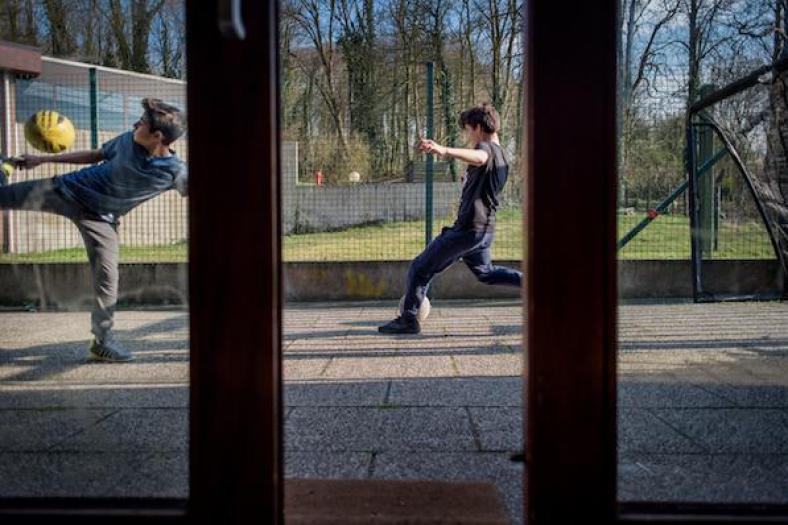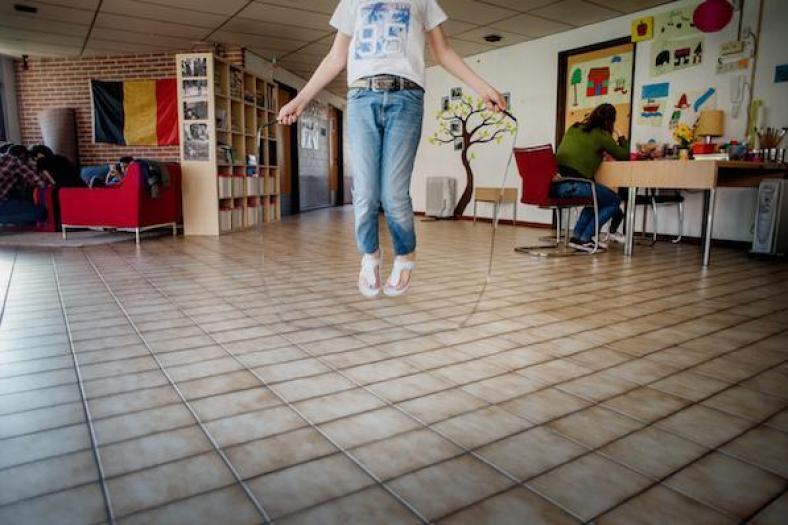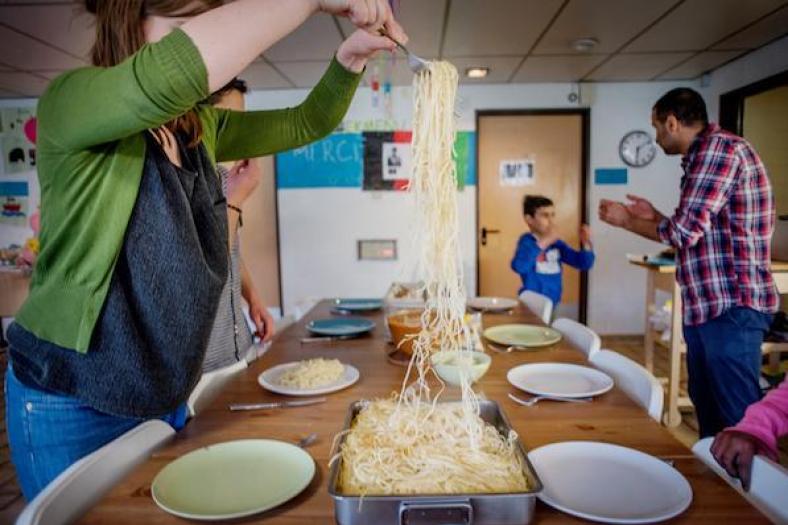A whole new world? Truths and terrors of the unaccompanied child refugees in Belgium

© Minor-Ndako
The living room is empty, but one boy is present. He sits on the sofa with his head bowed down, his arms functioning as crutches. He wants to speak to me, he mentions. He has something to say, but, he adds quickly, that he isn’t in the best mood today. I try to ease his mind by telling him we can have this conversation in Farsi, assuming he speaks Dari, the Afghan variant, but he reacts rather sharply: ‘Dutch will be just fine.’
‘Would you like something to drink?’, he asks politely. He makes his way into the kitchen, one he shares with the cook and the eight other Afghan boys who live here with him. Those other boys, all between twelve and sixteen years old, are at school, but he is here. He comes back with a glass of water.
Sleepless nights
The center of Minor-Ndako in Anderlecht has room for thirteen children on the run. UMAS, we call them in refugee-terms: Unaccompanied Minor Asylum Seekers. Given that about thirteen of them arrive in Belgium every month, the amount of space provided by Minor-Ndako, nine beds and four studio’s, seems inadequate, to say the least.
Upon arriving in Belgium, the UMAS spend several weeks in an Observation and Orientation Center (OOC). In a second phase they are referred to a collective asylum center, like those of the federal government, or a center of the Red Cross. Those older than sixteen and sufficiently independent, may go to a local shelter (LOI), organized by local OCMW’s.
The most vulnerable children who cannot find suitable help within the federal shelters, end up in centers such as Minor-Ndako. On a national level, Minor-Ndako has 54 residential locations and 88 places for independent living for unaccompanied minor asylum seekers in Brussels, Aalst and Ghent.
The International Convention on the Rights of the Child stipulates that he is entitled to documents and childcare only until that age. With that, the reason for his sleepless nights.
Arash* is seventeen years and one month old. He repeats that to me five times. He stayed home today, that’s what he has called this center for the past two years, ‘because he couldn’t sleep, yet again.’ The stiff attitude he held onto at the start of the conversation is steadily declining. ‘Look’, he says suddenly as he moves closer and talks more quietly, so that the rest is unable to hear him, ‘I have been waiting for an answer to my asylum application for two years now.’
So, eleven more months before the dreaded age of eighteen. The International Convention on the Rights of the Child stipulates that he is entitled to documents and childcare only until that age. With that, the reason for his sleepless nights. “I just hope I won’t be sent back.”
Crying and macho behavior
During the refugee crisis of 2015, more than three thousand children on the run, without parents or family, arrived in Belgium. One thousand of those three thousand children were diagnosed as being traumatized, be it from wars in their homeland, or the long and inhumane journey that followed to Belgium.
The amount of UMAS applicants steadily declined after that year (1000 in 2016, 800 in 2017), but the task of getting these children the help they need, is long unfinished. These minors are displaced and uprooted and, even more, as a newcomer, have a long and difficult process of integration ahead of them. What impact does this have on the emotional wellbeing of these young people? And above all, how can Belgian social assistance offer a solution?
Arash arrived in Brussels some two years ago. He embarked on a journey from asylum center to asylum center. ‘It was horrible,’ he sighs. The continuous moving around can serve as the last straw for some of these UMAS.
‘You get to know people and have to say bye to them again,’ he explains. ‘Sometimes I was in a room with so many other people, with so many languages and cultures, that we would fight. Teenagers who need to cry, but don’t dare to, who use macho behavior from time to time as a way to protect themselves. Above all, we spoke Afghan to the other Afghans, inhibiting ourselves from learning Dutch. You get frustrated, and you don’t grow.’
Things are different here in the center of Minor-Ndako in Anderlecht. The young people who end up here, always have something to do. During the day they go to school - education allows them to just be a child, while filling their days with knowledge. When they come home, a group of team leaders await them to work on homework together, eat together and plan activities together. These social relations are just as crucial in the lives of these children without families. At the dinner table, it becomes obvious just how much these young souls, the leaders and even the cleaning ladies and cooks give to each other.
Traumas and stress
‘They do just about everything to make you feel welcome, and I appreciate it,’ Arash says. I see pictures of every child who lives here, I see group pictures and soothing words on the wall. In one corner of the room there is a Playstation with an upwards of five controllers. Arash interrupts my screening of the scene: ‘But what they can’t prevent, is that my heart breaks from waiting so long.’
‘I had another panic attack last night. « What about my papers? » is the question that goes through my head all night. I stayed home today, but i’d love to be in school. I wanna do well, get good grades, but sometimes it’s just too hard.’ Arash looks at me with tears in his eyes, something he had clearly rather kept from happening. ‘May I leave now?’, he asks.
What makes the psychological help even more crucial, is the fact that even after fleeing war traumas can occur.
The care for refugees in Belgium, according to psychologists, educators and those in direct contact with the refugees, is that it is not tailored enough to the needs of the young people. The losses they have dealt with, the traumas that follow, all ask for psychological help. And while there is no control over the traumatic experiences anymore, there is with regards to how it affects them today.
Arash is a painfully perfect example of what the psychological help can mean in the lives of UMAS. At night he lies awake as a cause of his stress. He also explained that the police didn’t believe, when he had just arrived, that he was only sixteen years old. For months he had to go through several tests, like bone scans and others, to prove his age. Though this is part of the procedure, it is nonetheless extremely heavy for the already traumatized and fragile children.
Furthermore, not the type of trauma but the amount of traumas define the well-being of the children. What makes the psychological help even more crucial, therefore, is the fact that even after fleeing war traumas can occur.
Understand and limit
Before leaving, Arash told me that there was ‘luckily a Kerstin’ present every day. She is the resident psychologist at Minor-Ndako. Her office is only several meters away from the living room.
We think about how we can mean something, given the difficulties and the lack of trust that they have had at home, on their way to Belgium and upon their arriva
When I knock on her door, one of the youngest children of Minor runs out of her office. ‘Come on in,’ she says from her office, the go-to place for all the minors in Arash’s group. ‘Our task,’ she starts to explain, ‘is providing them with a supportive environment. We think about how we can mean something, given the difficulties and the lack of trust that they have had at home, on their way to Belgium and upon their arrival. What will never disappear, is how deeply they miss some things that they have left behind.’
The conversation with Kerstin makes it quite clear that Arash is in no way a unique case. Boys who lie awake at night are frequent visitors of hers. The weight of the loss they endured, bears heavy. And not only does this cause problems for the boys themselves, but also for their teachers at school. Luckily, Kerstin says, teachers have made it a habit over the years to call her and discuss options. When schools work with psychologists and other educators, they become crucial in the early detection of psychosocial problems.
Kerstin encourages the teachers to understand and limit. ‘We can’t always think « oh poor boy », because it doesn’t help them move forward. We have to work towards their futures, and that only happens when we combine understanding with limiting,’ she says. She provides an example of a boy who was always late to school because he had a hard time falling asleep at night. ‘The teachers were so nice to him that he got used to sleeping in. That doesn’t help at all, you see?’

© Minor-Ndako
Therapy is taboo, tennis is not
‘We motivate the young people to participate in sports, to be creative, and many do this as a form of therapy. It really helps,’ Kerstin explains. It’s an approach that more easily blends with the cultural habits and values of some of these young refugees. Speaking about problems is taboo for most. ‘Above all, speaking about your background, while an adult takes notes, can feel like a police interrogation. This can lead to fear or feelings of being unsafe, especially with children from unstable regions where it is hard or even impossible to trust someone,’ Kerstin adds.
‘That’s the reason why Minor-Ndako introduce themselves and their ways of working way before they ask the children any personal questions. It is in this way we want to make a difference, with a team of educators. The psychologists at Minor-Ndako find it important that these children feel at ease, that they have control over what they say and what they don’t.’
‘This should prepare the children for when they live alone, or more independently, to seek help when it is necessary. Seeking help from other psychologists in a more private setting is something that still seems very difficult. This is why we work with small changes.’
Hamza wants to help
Those small changes mean a whole lot for some. Hamza* is sixteen years old, and arrived in Belgium three years ago. Eighteen months after moving into Minor, he was allowed to move into his own studio, for « roomtraining », right above the rest of the boys. How he deserved that? ‘Working hard and growing,’ his mentor Jana explains. Hamza goes to get some tea and puts a small bowl with sweets in front of us, his smile even bigger than his mentor’s pride.
Since his arrival at Minor, Hamza goes boxing three times a week. ‘It helps me deal with stress,’ he says. ‘As a young refugee, you have to think of a lot.’ The most recurring question at the helpdesk of Minor-Ndako, Manorea, comes from young refugees that have to file their own paperwork.
A legal guardian can help at this point, but it’s the children themselves who carry this administrative burden. ‘It is nearly impossible for them to do it alone,’ one helpdesk-worker adds. And yet, they have to.
‘I want to earn money as soon as possible and help people. I have gotten so much from people on the street, in every country. That’s why I already try to give what I have, but I don’t have much money yet.’
‘Especially back when I didn’t have any papers, I had a hard time,’ Hamza says. ‘I got my papers in the same year I arrived here, so I was lucky. Many boys I know have seen a different reality.’
For Hamza, things get better every day, he tells me. ‘I have learned to only look forward.’ He is currently studying to become a cook, in Mechelen. ‘I want to earn money as soon as possible and help people. I have gotten so much from people on the street, in every country. That’s why I already try to give what I have, but I don’t have much money yet.’ His mentor tells me that Hamza wants to become a boxing champion because that would also give him some money to give to others.
Right before he leaves for his boxing training, we take a moment to speak about his home country. Hamza says he doesn’t have much contact with his family. ‘I feel really guilty sometimes. Guilty because I have so many different chances here, while my family is living in grave circumstances back home. They don’t have any ways to grow in Afghanistan, and I have them, thanks to the help I’ve gotten here.’

© Minor-Ndako
The importance of the little things
Mirana* has been a cleaning lady at Minor-Ndako for fourteen years. ‘You may call me tata,’ she says spontaneously, ‘the boys do it too.’ Mirana arrived in Belgium seventeen years ago. ‘I understand how the kids must feel, even though I wasn’t a refugee myself. If you know how they get her, you realize what they have lost. They’re all alone and sometimes there is no one to help them out. I know what all these small things can do for them.’
‘In that sense, Minor-Ndako is really important for these boys. The people who work here do so much for them. I mean, they even have halal products here now, because many of the children come from muslim countries. That says a lot. They can first learn to feel at home, so that they can learn the language with ease, and accustom themselves slowly into this new, Belgian life.’ Miranda serves as a grandmother in this process, who helps them wash their clothes, sew them, and more.
‘Minor creates a family for these kids. It isn’t only a shelter, it’s a home. The downside is of course that after several years they have to leave again. That isn’t only heartbreaking for the crew who works here, but for the kids as well. Thankfully, many of them come to visit from time to time,’ Mirana says.
From problem child to dorm inhabitant
How hard the letting go really is, becomes clear during a visit to Major in Brussels. Major is the next step up from Minor, for UMAS of sixteen to eighteen years old with a little more independence. Elham* is sixteen years old and is leaving to go live on his own, in a dorm in Aalst, next to his school.
The staff of Major is standing in the doorway, proud yet sad, watching Elham fill the car with things he has collected over the last few years. A duvet, a computer, a waterboiler. ‘It’s kind of like going off to your dorm in college,’ Karin, his mentor, tells him. He stands behind the car so no one can see his eyes well up.
He will live in a dorm with five other Unaccompanied Minor Asylum Seekers and six Belgian college students. Karavanserai is one of the Minor-Ndako projects that allows the children to live alone, with a bit of guidance from time to time.
Elham pulls the boxes out of the car one by one. ‘There’s even a couch here! Maybe I can invite some friends,’ an enthusiastic Elham exclaims. In a first interview with his new mentor, he hears that she will visit him once weekly. What follows is his to-do list with no missing detail: from the buspass he will shortly receive, the costs of gas and water he will have to pay, to the location of the nearest supermarkets.
‘And if you have a moment when you’re not feeling well, Elham? Do you know who you can call? his new mentor asks him. ‘You, I think?’ he reacts with a smile. He rejoices in this idea of being able to live alone, but is clearly relieved to know there is always someone there to support him. He needs that, until he can stand on his own two feet completely.
‘You’ll come visit me right, Karin?’ Elham asks his old mentor. All the noise leaves the room, they say their goodbyes. A little later, Karin and I make our way back to Brussels. ‘Three years ago Elham came to us broken and alone,’ she tells me. Today, he lives next to his school, he can go play sports, invite friends and he knows there are people to help him. A whole new world.
This documentary was made possible thanks to a MO * research grant, and with the assistance of Minor-Ndako’s staff in Anderlecht, Aalst and Brussels.
*All names were changed out of respect for the privacy of the children.
Maak MO* mee mogelijk.
Word proMO* net als 2793 andere lezers en maak MO* mee mogelijk. Zo blijven al onze verhalen gratis online beschikbaar voor iédereen.
Meer verhalen
-
Report
-
Report
-
Report
-
Interview
-
Analysis
-
Report











 Oxfam België
Oxfam België Handicap International
Handicap International